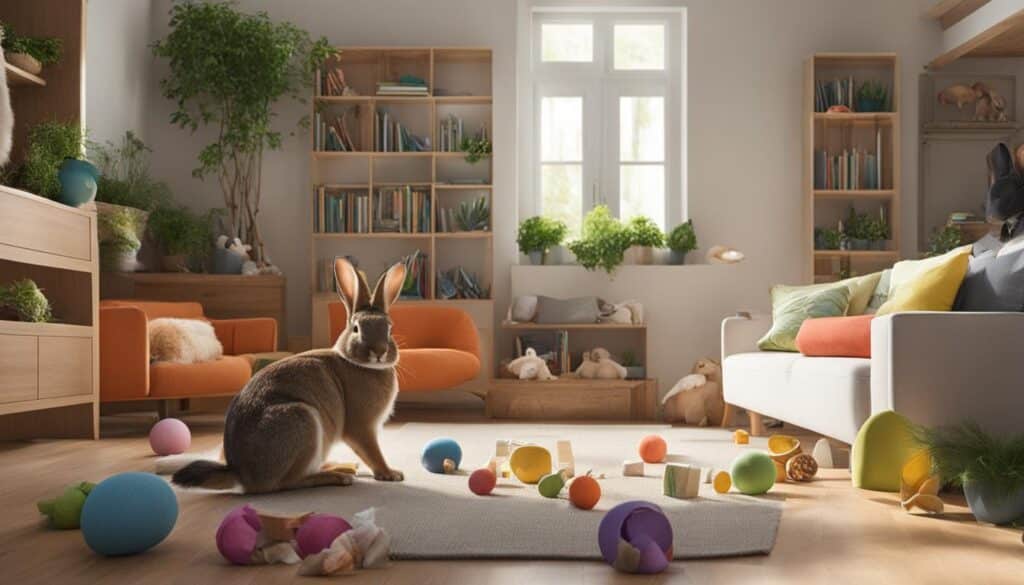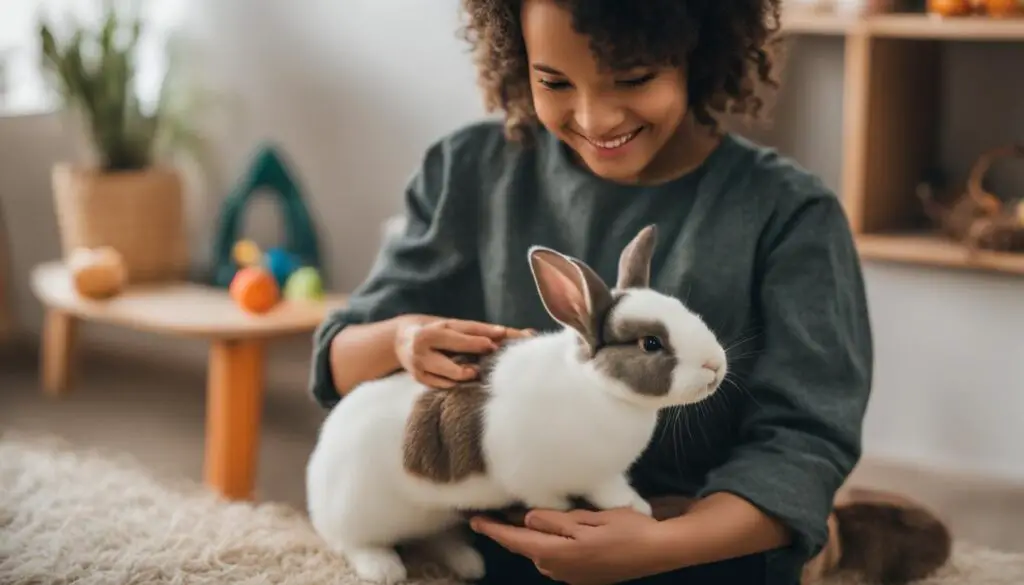Welcome to our guide on building a strong and healthy bond between rabbits and humans. Whether you’re a new rabbit owner or looking to improve your existing relationship, this article will provide you with valuable tips and techniques to strengthen your connection. Rabbits are intelligent and social animals who can form deep bonds with their human companions, and it’s essential to create a nurturing environment that fosters trust and mutual understanding.
Spaying or neutering young rabbits is a crucial first step in promoting a healthy bond. Along with improving their behavior, these procedures enhance their overall health, making it easier for them to bond with humans and other rabbits. Patience is key when interacting with rabbits, allowing them to approach you on their own terms. Instead of insisting on holding your rabbit, get down on their level and let them come to you for physical closeness. Using treats like carrot chunks or special treats like apple or willow chew sticks can help build trust and facilitate bonding. Engaging in play sessions with your rabbit, using interactive toys, can also increase bonding opportunities.
It’s important to be mindful of your rabbit’s feelings and to recognize signs of fear or discomfort. Avoid bonding activities when your rabbit is feeling tense or frightened, and always ensure their cage is clean and their diet is healthy. Ordering farm fresh hay and providing them with healthy chew toys contributes to their overall well-being and strengthens the bond between you and your rabbit.
Key Takeaways:
- Spaying or neutering young rabbits helps improve their behavior and overall health.
- Be patient and allow rabbits to approach you on their own terms.
- Use treats and interactive toys to build trust and facilitate bonding.
- Recognize signs of fear and avoid bonding activities when your rabbit feels tense.
- Provide a clean cage and a healthy diet to ensure your rabbit’s well-being and strengthen the bond.
Spending Quality Time with Your Rabbit
Building a strong bond with your rabbit requires spending quality time together and creating an environment where they feel safe and comfortable. By engaging in activities that allow your rabbit to trust you and build a positive association with your presence, you can foster a deep and meaningful connection.
Sitting or laying down with your rabbit at their level is a simple yet effective way to build trust. This non-threatening approach allows them to approach you on their own terms, establishing a sense of security and comfort. By being patient and giving them the freedom to interact with you at their own pace, you can create a foundation of trust and mutual understanding.
One way to spend quality time with your rabbit is by sharing a safe enclosure. This enclosed space provides a sense of security and allows you to engage in quiet activities, such as reading or using your phone, while your rabbit explores and observes their surroundings. This proximity helps them feel more comfortable in your presence and encourages a sense of bonding.
It’s crucial to respect your rabbit’s boundaries and let them come to you. Rabbits are prey animals and may become scared or stressed if they feel cornered or forced into interactions. By allowing your rabbit to approach you when they feel ready, you foster a sense of trust and create a positive environment for building a bond.
Consistency is key when it comes to bonding with your rabbit. Establishing a daily routine that includes regular interactions and dedicated time together can strengthen the bond between you. Whether it’s grooming, playing, or simply spending quiet time together, these consistent moments of connection contribute to a deeper and more meaningful relationship.
Training your rabbit can also be a valuable bonding experience. Spending time together, learning to understand their body language, and rewarding them with treats for learning tricks all contribute to building trust and strengthening your bond. Training sessions create an opportunity for focused interaction and mental stimulation, enhancing the quality of your bonding time.
While spending quality time with your rabbit is essential, it’s crucial to avoid picking them up too frequently. Rabbits value their personal space, and allowing them to have their own area helps them feel safe and secure. Respecting their boundaries and providing them with the freedom to explore and interact on their terms is key to maintaining a healthy and trusting relationship.
Investing time and effort into spending quality time with your rabbit is invaluable for building a strong bond. By creating an environment of trust, respect, and understanding, you and your rabbit can enjoy a fulfilling and enriching relationship for years to come.
| Activity | Description |
|---|---|
| Sitting or laying down | Get on your rabbit’s level and allow them to approach you. |
| Spending time in a safe enclosure | Engage in quiet activities while your rabbit feels more comfortable in your presence. |
| Letting the rabbit come to you | Avoid forcing interactions to prevent your rabbit from feeling scared or cornered. |
| Building a daily routine | Regular interactions and dedicated time together strengthen the bond. |
| Training your rabbit | Spending time together, understanding body language, and rewarding them for tricks enhances bonding. |
| Avoiding excessive picking up | Respect your rabbit’s personal space and let them feel safe. |
Building Trust and Positive Associations
Building a strong and healthy bond with your rabbit requires patience, gentle handling, and positive experiences. By following these techniques, you can create a foundation of trust and positive associations that will strengthen your relationship with your furry friend.
1. Patience and gentle handling: Take the time to let your rabbit approach you on their own terms. Avoid grabbing or picking them up by their ears or any other body part, as it can cause them pain and potentially lead to injury. Instead, use calm and gentle movements to handle your rabbit, allowing them to feel safe and secure in your presence.
2. Treats for positive experiences: Offering treats during handling sessions can help your rabbit associate being handled with positive experiences. Use their favorite treats as a reward for their cooperation and gradually increase their comfort level with handling.
3. Providing safe toys: Rabbits are curious creatures that love to explore and play. By providing them with safe toys, you can encourage them to satisfy their natural instincts while building trust with you. Choose toys that are free of small, chewable parts to ensure their safety.
4. The value of companionship: Rabbits are social animals and thrive in the company of others. Consider providing your rabbit with a compatible companion to enhance their well-being and overall bond with you. However, always introduce new rabbits properly and monitor their interactions to ensure a positive relationship develops.
5. Recognizing signs of happiness: Watching for signs of happiness in your rabbit, such as relaxed body language and playful behavior, is essential to gauge the strength of your bond. Positive associations will be evident in their behavior when they feel comfortable and content in your presence.
By following these strategies, you can build trust and positive associations with your rabbit, fostering a healthy and strong bond. Remember to always prioritize your rabbit’s comfort and well-being, and enjoy the rewarding experience of deepening your connection with these wonderful creatures.
Creating a Safe and Enriched Environment
Creating a safe and enriched environment for your pet rabbits is crucial for their overall well-being and happiness. Rabbits have natural instincts that need to be fulfilled in order for them to thrive. By providing a safe and enriched environment, you can ensure that your rabbits feel comfortable, secure, and able to exhibit their natural behaviors.
Giving your rabbits plenty of space to run, play, and exercise is essential. This allows them to explore their surroundings and engage in activities that are important for their physical and mental health. Whether it’s a large indoor enclosure or a secure outdoor space, providing ample room for your rabbits to move around freely is key.
When interacting with your rabbits, it’s important to allow them to approach you on their own terms. Forcing interactions can lead to fear and anxiety, eroding trust and hindering the bonding process. By respecting their boundaries and giving them the freedom to decide when they want to interact, you can foster a positive and trusting bond.
To further enhance their environment, provide your rabbits with safe and stimulating toys. Toys that encourage their natural instincts, such as chewing and digging, are especially beneficial. This not only keeps them entertained but also promotes healthy dental wear and satisfies their instinctual behaviors.
In addition to toys, establishing a daily routine can provide a sense of security for your rabbits. They thrive on predictability, so feeding them at consistent times and maintaining a regular daily routine can help them feel more comfortable and settled in their environment.
Furthermore, it’s important to avoid actions that may make your rabbits feel trapped, distressed, or threatened. Avoid picking them up frequently or placing them on their backs, as this can cause stress and discomfort. Instead, focus on creating an environment that allows them to feel safe and secure.
Rabbits are social animals and benefit from companionship. If possible, consider providing a companion of the opposite gender for your rabbit. This can fulfill their social needs and enhance their overall well-being and bond with their human caregivers.
Observing and understanding your rabbit’s unique personality and behavior is essential. Pay attention to their body language, habits, and preferences. This will help you quickly identify if they are happy and content in their environment.
Enrichment Ideas for Rabbits
| Type of Enrichment | Description |
|---|---|
| Chew Toys | Provide safe chew toys made from natural materials to satisfy your rabbit’s natural chewing instincts and promote dental health. |
| Tunnels and Hideouts | Offer tunnels and hideouts where rabbits can retreat to for privacy and security. |
| Foraging Toys | Create or purchase toys that allow rabbits to forage for food, stimulating their natural instinct to search for food. |
| Obstacle Courses | Set up safe and interactive obstacle courses to provide mental and physical stimulation for your rabbits. |
| Herbs and Greens | Provide a variety of fresh herbs and greens for rabbits to nibble on, offering both nutritional value and mental enrichment. |
The Value of Training and Positive Reinforcement
Training your rabbit is not only a fun and rewarding experience but also plays a crucial role in strengthening the bond between you and your furry friend. It offers numerous benefits, including mental stimulation, trust-building, and fostering a positive association with you.
When training your rabbit, it’s important to strike a balance and avoid over-reliance on treats. While treats can be used as a form of positive reinforcement, it’s essential to ensure a healthy diet for your rabbit. Supplementing their training sessions with verbal praise, gentle strokes, and other non-food rewards can reinforce the bond between you.
Teaching your rabbit tricks serves as an excellent opportunity to bond with them. It allows you to spend quality time together, understand their unique personality, and create shared experiences. By allowing your rabbit to earn treats through learning and performing tricks, you enhance their bond with you and prevent them from solely relying on treats for interactions.
During training sessions, it’s crucial to respect your rabbit’s boundaries. By understanding their body language and cues, you can ensure a comfortable and stress-free environment. This mutual understanding promotes trust and a positive bond between you and your rabbit.
Training sessions not only benefit outgoing rabbits but also help shy or timid rabbits become more confident and sociable. By gradually exposing them to new experiences and challenges in a safe and controlled manner, you can improve their overall quality of life and strengthen the bond with their human companion.
In addition to training, it’s important to engage in other activities that promote a strong bond and positive reinforcement. Spending quality time with your rabbit, providing a safe and enriched environment, and understanding their natural instincts are all essential elements in nurturing a healthy and loving relationship.
| Benefits of Training and Positive Reinforcement | Ways to Strengthen the Bond |
|---|---|
| – Enhances mental stimulation | – Spend quality time together |
| – Builds trust and mutual understanding | – Respect boundaries |
| – Fosters a positive association with you | – Use non-food rewards |
| – Prevents over-reliance on treats | – Teach tricks and reinforce learning |
| – Boosts confidence in shy rabbits | – Gradually expose to new experiences |
Conclusion
In conclusion, building a strong bond between rabbits and humans requires patience, understanding, and positive reinforcement. By spaying or neutering young rabbits, providing them with a clean and healthy environment, and engaging in regular quality time together, you can create a solid foundation for a lasting relationship. Remember to always respect your rabbit’s boundaries, allow them to approach you on their own terms, and use treats and toys to build trust and positive associations. With consistency and love, you can nurture a deep and meaningful connection with your furry friend.
Additionally, creating a safe and enriched environment for your rabbit is vital. Allowing them ample space to explore, providing stimulating toys, and considering getting them a companion can greatly enhance their overall well-being and strengthen their bond with you. By observing your rabbit’s behavior and understanding their unique personality, you can ensure they are happy and content in their environment.
Lastly, training your rabbit not only teaches them new tricks but also deepens the bond between you. Through positive reinforcement and understanding their limits, you can introduce mental stimulation and create a positive association with training sessions. By respecting their boundaries and maintaining a healthy balance with treats, you can improve their confidence and strengthen your bond even further.
FAQ
How can I improve the bond between my rabbit and me?
You can improve the bond between your rabbit and you by spaying or neutering them at a young age, being patient and allowing them to approach you on their own terms, and using treats and interactive toys to build trust and facilitate bonding.
What should I do to make my rabbit feel more comfortable around me?
To make your rabbit feel more comfortable around you, get down on their level, spend time in a safe enclosure engaging in quiet activities, and let them come to you rather than forcing interactions.
How can I recognize if my rabbit is scared or fearful?
You can recognize if your rabbit is scared or fearful by observing their body language, such as crouching, freezing, or trying to hide. If you notice these signs, avoid bonding activities and give them space to feel safe again.
Does providing a companion for my rabbit help strengthen our bond?
Yes, providing a companion for your rabbit can enhance their well-being and overall bond with you. Rabbits are social animals, and having a companion of the opposite gender can fulfill their social needs.
Is it necessary to train my rabbit to strengthen our bond?
Training your rabbit can be a bonding experience as it involves spending time together, understanding their body language, and rewarding them with treats for learning tricks. It helps strengthen the bond between you and your rabbit.







No Comments